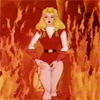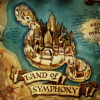
Before I begin today’s passionate rant o’ fiery-ness, here’s what started this blog post. A comment I made on Facebook saying:
If I measured my success as a writer based on everyone else’s opinions of me, I’d give up right now. I don’t. I’m not writing for validation. I write because I love doing it and even though a professional career in storytelling is extraordinarily difficult — what *isn’t* challenging that’s worth fighting for? I write because I love it. And I’ll keep on writing, regardless of where I “end up.”
And, here’s a quote that meandered to me via Steven Long.
“I try to trust my instincts as much as possible. As a writer, all you do is have people tell you you’re wrong and you suck 24 hours a day, so if you don’t listen to yourself, you’re just going to end up in a mental institution.” — Amy Sherman-Palladino
Negativity is ridiculous in our world today and it can overpower you if you let it. I don’t want to be one of those people who wallows in the awful and is so affected by it I don’t act or write or do the things I want to do. Have I suffered from depression at times? Yes. Have I worked through it? Yes. Have I spread that negativity around myself on occasion? Yes. I’m human. I make mistakes. Then I put on my big girl panties, deal with the situation the best I know how, and get over it. I’m not consistent. I’m not perfect. I’m flawed and beautiful and myself in all its various forms. I am human — just like you.
Opinions about how valuable “you” are in any field, creative or not, are rampant. The bad ones can get to you, wear you down, make you feel like shit about the fact that everything you’ve done is for this moment — to be “X” — isn’t worth a pound of salt, but you cannot let that happen. You can’t. And I can’t either.
Nine times out of ten, when someone tears somebody else down, it’s a reflection on the ripper-upper and NOT you. It’s a power play. Low self-esteem on their part. Jealousy. A point of frustration. Sometimes, it’s not even about you. They had a bad day. They’re depressed. Somebody died. They’re ignorant about publishing. They have a specific belief about a writer’s career path that won’t be changed. Other times, when it sounds negative but it’s really not, it’s a little tough love that comes down the pipe. Do you want to give up? Are you really writing or playing Angry Birds Star Wars? What is your work worth to you?
Here’s the secret: whatever you do? It will never be good enough. As a writer, there are layers and layers of “validation” built into this community. Are you popular? Did you win a Hugo/Nebula/ENnie? Did you get a movie/book deal? Who are you published with? How many books do you have out? How successful is the TV/film series based off your books? Did Publisher’s Weekly give you rave reviews? There is always something wrong with you or your work — unless you’re so successful you’ve managed to move past that, but even then? The negative comments won’t stop just because you’ve “made it.” They just take on different forms.
There are positive comments in there, too. Some are said with total and complete honesty; others, to butter your ego or get something out of you. Like the negative comments, these can also overwhelm you if you let them because if you’re doing your “thing” for validation — you’ll stop whatever that is once you achieve that goal either consciously or subconsciously. You start buying your own bullshit. However, for the vast majority of the creative folks out there, positivity is hard won and hard earned, which is why it’s so easy to believe in that fake persona, that rockstar image you’ve built up for yourself. Pokes about why something’s bad are more common than why it’s good.
What I worry about, is what’s good enough for my work, my legacy of stories and games. I don’t do this to be selfish. I do this to “protect the Work.” (That’s a quote from Christine Merrill, by the way.) I work based off of what I value because if I’m always worrying about what everyone else thinks, outside of the editor/publisher/agent production cycle — then I won’t write and I don’t push forward. (It’s also important to remember the human side of the equation. There is such a thing as focusing on the work so much you forget you deserve to be treated well, too. I’ve done this and lesson learned!) Otherwise, it’ll always be about that one jerk reviewer. That asshole writer. That crappy publisher. An unsupportive family. Some douchebag on the street. And if you stop writing because of them — wherever that negative voice hails from — then you let them rule your life.
This, my readers, this is where moments of true weakness comes from. When you allow someone else to get so far into your head you stop being true to that awesome person inside yourself. I believe we are awesome. I do. But I feel like so many people allow themselves to be beat down by life, you forget the loveliness inside of you, and you get so tired your “fire” just gets snuffed right out. Don’t light a match — burn a torch! A bonfire! Roast marshmallows ’cause you’re on fire! You want to know why the assholes seemingly win? Two reasons: because we focus on that and highlight them instead of the brighter side, and because awesome folks like you have given up!
I don’t write because I’m desperate for other people’s opinions. (Some are necessary are part and parcel to doing business. I’m talking about straight up validation, here.) Everything I care about is with respect to the work, but even then there are times when snarky, overly-critical comments are made simply because there’s a personality conflict. When something bad happens, I whine and eventually (hopefully sooner rather than later) I get over it and I keep going. This is not just about persistence, my readers, this is ALSO about being RESILIENT.
Resilience means the bubble around you is not a hard shield, but a flexible, bendy material. Sometimes, things will bounce right off you. Other times, it’ll sink in. Maybe YOU’RE having a bad day. Maybe you’re in pain, physically. Maybe you’re hungover. Maybe the past has stained you. Maybe you’re so focused on the words people are using instead of what they mean. Whatever the case, not everything will bounce off. That is NOT possible for anyone whose job is focused on words — because WORDS DO MATTER. The trick is recognizing those times and dealing with them appropriately, in your own way, so you keep on, keepin’ on.
NOW GO FORTH! GET OFF YOUR BUM. AND BE AWESOME!
- Mood: inspired
Caffeinated Beverages Consumed: You’d be surprised…
Work-Out Minutes Logged Yesterday: Gym, Gymanee.
In My Ears: A dog, barking.
Game Last Played: Dragon Age: Awakenings
Movie Last Viewed: The Hobbit
Latest Artistic Project: Holiday gifts
Latest Release: “The Button” We Are Dust anthology

